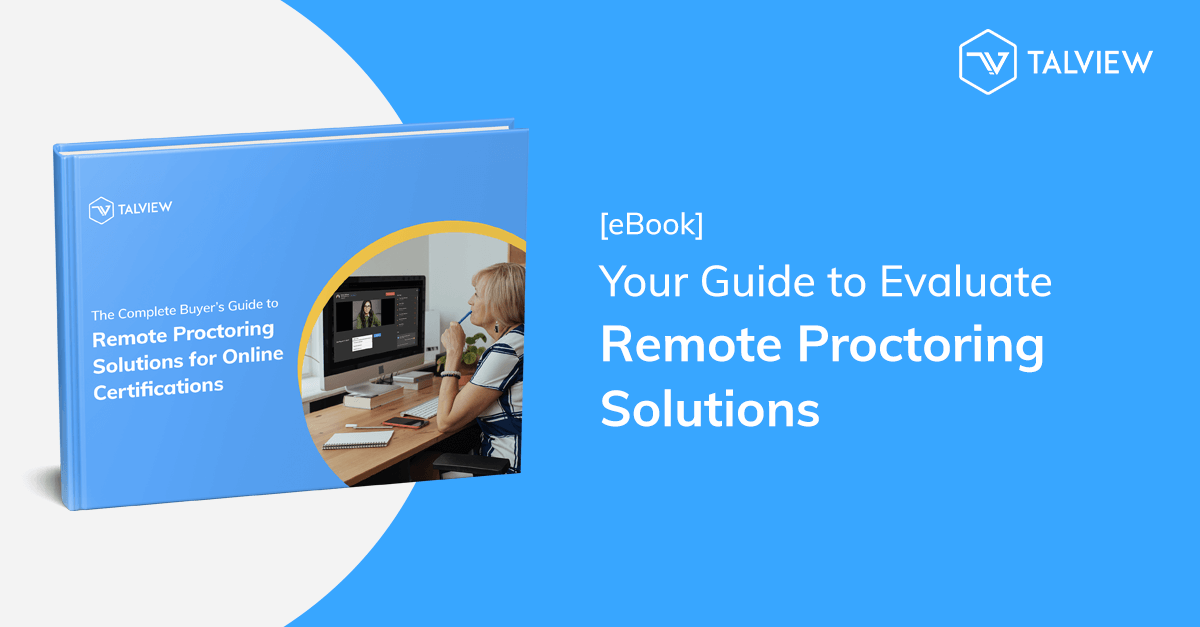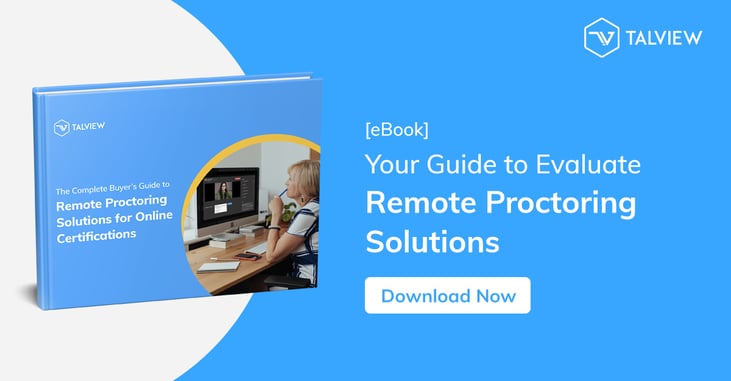Our latest buyer’s guide is a comprehensive overview of everything you need to take into account when choosing a remote proctoring solution for your certification business, so we’ve put together a quick overview of the important things you need to consider. Alternatively, read the full The Complete Buyer’s Guide to Remote Proctoring Solutions for Online Certifications now.
Across industries, certification providers are transitioning to a remote test-taking model. Online assessments have gone from a nice-to-have to an essential offering to increase access and convenience for test-takers, whether within the IT industry, financial services, or the public sector.
With this shift, comes the need for a remote proctoring solution that helps you bring the integrity, security, and experience of in-person assessments into the online realm. There are a number of solutions out there, and the global online exam proctoring market is growing rapidly – it’s predicted to reach a value of $1.18 billion USD by 2027.
So, what are the most important things to consider to ensure you make the best choice for your proctoring needs?
Versatility and flexibility
A good proctoring solution should cater to changing needs and circumstances. It should allow you to leverage multiple formats of assessments, from technical skills tests to communication skills evaluations, and should allow administrators to grade test-takers and deliver results in the platform.
You might also need the solution to offer both live (with a proctor present) and automated (without a proctor) proctoring, depending on the volume of tests and how high stakes they are. The solution should seamlessly integrate with any other platforms too, whether that’s your own assessment delivery platform or a learning management system.
Security and Privacy
Cyber attacks and fake credentials are no stranger to the online certification industry – so security controls need to be stringent in order to protect candidate data and your intellectual property (IP).
It’s important to consider how the solution manages personally identifiable information (PII) and check that they are compliant with regulations such as SOC 1, SOC 2, GDPR, or COPPA. Vital security features to look out for include multi-factor authentication, end-to-end encryption, classification of data, secure operations and access, threat management, and hardware security and physical security safeguards.
Accessibility
The accessibility of any digital product that’s being used by a wide range of people is crucial. This means adhering to specific guidelines such as WCAG to cater to test-takers with diverse needs, and including features such as speech-to-text, audio questions, and increased font size.
Accessibility also encompasses those who may be from a lower socioeconomic background or live in rural areas – as such, the solution should be mobile-friendly and work with low bandwidth.
Exam Integrity
Preventing malpractice is a top priority with any exam, whether in-person or online. With the right features, exam integrity isn’t compromised in the virtual realm. Look out for solutions that include multiple authentication checks to avoid impersonation of the test-taker, dedicated exam browsers that lock down the screens of the test-taker to only be able to access files, pages, and documents relevant to the exam, environment checks, question paper watermarking, and browser patrolling.
The solution might also use artificial intelligence to alert administrators of potential instances of cheating, and allow them to go back and review recordings.
Eliminating Bias
AI-powered solutions can help you eliminate the bias that inherently comes with the exclusive use of human proctors. The AI can be programmed to disregard factors such as race, gender, or appearance, reducing the likelihood of discrimination.
Total Cost of Ownership
When choosing a remote proctoring solution, it’s important to consider the ongoing costs of its operation too. This means thinking about how the solution vendor might help you train your human proctors, or provide them outright, and how they might be able to scale this support according to your needs.
It’s also worth investigating whether or not the vendor collects feedback from its customers to deliver new features that align with customer needs.
The Complete Remote Proctoring Guide
Remote proctoring capabilities are now essential for certification providers in order to meet candidate needs, protect integrity, and comply with data regulations, so it’s vital that you know exactly what you’re looking for. Interested in learning more?
Download the full remote proctoring buyer’s guide.








Leave a Reply